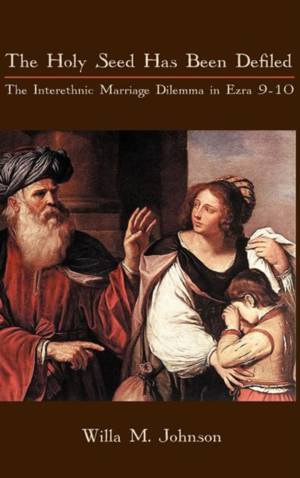
Je cadeautjes zeker op tijd in huis hebben voor de feestdagen? Kom langs in onze winkels en vind het perfecte geschenk!
- Afhalen na 1 uur in een winkel met voorraad
- Gratis thuislevering in België vanaf € 30
- Ruim aanbod met 7 miljoen producten
Je cadeautjes zeker op tijd in huis hebben voor de feestdagen? Kom langs in onze winkels en vind het perfecte geschenk!
- Afhalen na 1 uur in een winkel met voorraad
- Gratis thuislevering in België vanaf € 30
- Ruim aanbod met 7 miljoen producten
Zoeken
€ 101,95
+ 203 punten
Omschrijving
In the Book of Ezra-Nehemiah, Ezra commands Yehudite men to put away their foreign wives to avoid further defiling the 'holy seed'. What is the meaning of this warning? Are Ezra's words to be understood as a concern about race-mixing or is it emblematic of some more complex set of problems prevalent in the fledgling postexilic community? Ezra's words, with their seemingly racialized thinking, have been influential in much political, religious and popular culture in the USA. It has been a backdrop for constructing racial reality for centuries, melding seemingly biblical ideologies with accepted European Enlightenment-era ideas about racial superiority and inferiority. Willa Johnson combines archaeological data with social-scientific theory to argue for a new interpretation. In this anthropological and narratological analysis, Johnson views Ezra's edict in the light of ancient Yehudite concerns over ethnicity, gender, sexuality and social class following the return from exile. In this context, she argues, the warning against intermarriage appears to be an effort to reconstitute identity in the aftermath of the cataclysmic political dominance by first the Babylonian and then the Persian empires. This book represents a postmodern interdisciplinary approach to understanding an ancient biblical socio-political situation. As such, it offers fresh perspectives on ways that interpretations of the Bible continue to reflect the ideologies of its interpreters.
Specificaties
Betrokkenen
- Auteur(s):
- Uitgeverij:
Inhoud
- Aantal bladzijden:
- 146
- Taal:
- Engels
- Reeks:
Eigenschappen
- Productcode (EAN):
- 9781907534218
- Verschijningsdatum:
- 28/09/2011
- Uitvoering:
- Hardcover
- Formaat:
- Genaaid
- Afmetingen:
- 156 mm x 234 mm
- Gewicht:
- 381 g

Alleen bij Standaard Boekhandel
+ 203 punten op je klantenkaart van Standaard Boekhandel
Beoordelingen
We publiceren alleen reviews die voldoen aan de voorwaarden voor reviews. Bekijk onze voorwaarden voor reviews.









